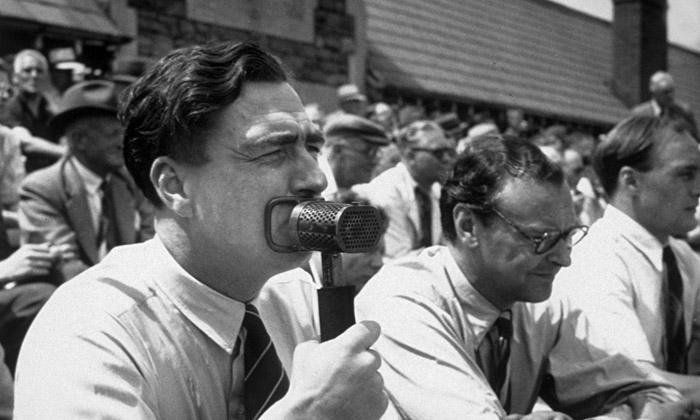Good sports commentary is hard to come by nowadays. On occasion we hear balanced, interesting analysis, but most of the time it feels like we’re being drowned in a sea of ads, stats, and clichés.Being a good commentator boils down to three prerequisites. The first is to know your role. Are you a radio broadcaster or a television analyst? Radio broadcasters have to describe the match in totality. They have to make their listeners feel as if they were at the game.
I grew up on the BBC radio’s cricket commentary. The broadcasters fired my imagination. They made me feel every shock, twist, and turn. I could visualize the unexpected through their leaping tones. They filled lulls in the play with fascinating insights into the history and politics of the game.
The greatest commentator in BBC history was John Arlott. Wisden Cricketers’ Almanac—known as the “Bible of Cricket”—describes him as a poet at heart.
“He could describe a piece of play without fuss or over-elaboration, being always conscious of its rhythm and mindful of its background,” the Almanac reads.
As such, he gave the listener’s imagination free rein to interpret his description of the play. Dripping with irony, he once described a piece of play where South African cricketer Tufty Mann bowled out his counterpart George Mann as “a case of Mann’s inhumanity to Mann.”
Television commentators, on the other hand, should speak less. According to Richie Benaud, a legendary commentator in the game of cricket, the key is to “never insult the viewer by telling them what they can already see.” Vin Scully, one of the greatest baseball announcers, waits for the sporting scene to unfold and then draws attention to the defining points of that play.
Scully is concise and measured. He once described the artistry of Atlanta Braves’ pitcher Tom Glavine as such: “He’s like a tailor; a little off here, a little off there and you’re done, take a seat.”
Anyone who had just turned on the TV would immediately know the significance of the play. There was no unnecessary description of the pitch itself. The spectator could therefore easily adjust to the contest and be able to watch with a greater understanding.
The second rule to good commentary is to avoid clichés. Soccer commentators are known for their original turns of phrases. In 1981, Norwegian commentator Bjorge Lillelien responded to Norway’s unlikely 2-1 victory over England with a deliciously original hyperbole:
“Lord Nelson! Lord Beaverbrook! Sir Winston Churchill! Sir Anthony Eden! Clement Attlee! Henry Cooper! Lady Diana! Maggie Thatcher–can you hear me, Maggie Thatcher! Your boys took one hell of a beating! Your boys took one hell of a beating!”
He captured how satisfying it is to beat the English at the game they invented, but he also tapped into the mindless hysteria and joy that football generates, because no cliché could capture the unlikeliness of that moment.
Finally, commentators should have an appealing voice. The peerless Benaud still narrates my cricketing memories, while baby boomers fondly recall Phil Rizzuto’s distinctive New Jersey accent and his timeless catchphrase, “Holy cow!”
Boxing commentator Harry Carpenter was known for his unflappable delivery. When a riot broke out after the heated Marvin Hagler-Alan Minter fight in 1980, Carpenter weathered beer cans and bottles to condemn the bout as “a shame and disgrace to British boxing.” His understated style gave his analysis more credibility—you could trust Carpenter to call huge events like the Rumble in the Jungle in 1974.
Ideally, networks such as CBC, Fox, and TSN will try to hire commentators who meet the above criteria. That way, no one has to hear Trent Dilfer say, “You cannot lose games in the NFL and still win” ever again. Ever.
Top five sinful commentating clichés
1. “You can’t script it better than this!”—said despite the fact that one definitely can.
2. “You hate to see that.”—said as cue for producer to show replay of gruesome injury.
3. “He just wanted it more.”—said in post-game recap about the star play on whichever team won.
4. “He’s got great [sport] IQ.”—said when praising LeBron James.
5. “This is a great team on paper.”—said about a team that has yet to regular season game.









